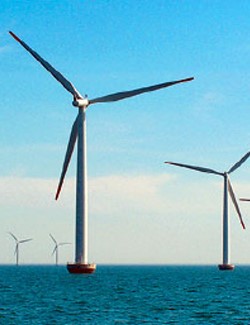|
Consider the potential impact from Cape Wind: According to the Minerals Management Service review, Cape Wind's generation capacity would average 182.6 megawatts, or about 1,600 gigawatt-hours (1.6 billion kilowatt-hours) of electricity per year. An average New England household uses roughly 7,150 kilowatt-hours of electricity per year, so Cape Wind's projected output would be enough to meet the yearly demand from about 223,776 households. This output is equivalent to about 75 percent of average electricity demand on the Cape and Islands. Electricity from Cape Wind would reduce the flow of electricity from other sources into the Cape and Islands grid. Cape Wind is a symbol of the willingness of the people of Massachusetts to invest in a green future and I support Cape Wind as it goes from a bright idea to reality. Leading environmental organizations including Greenpeace, the Natural Resources Defense Council and the Sierra Club, which has endorsed my candidacy, want Cape Wind to be implemented. And Cape Wind isn't the only environmentally sound idea that's good for Massachusetts citizens. There are currently more than 12,000 renewable energy businesses in Massachusetts (http://energy.sourceguides.com/businesses/byGeo/US/byS/MA/MA.shtml) - and growing! In addition to providing clean, sustainable, renewable energy, projects like Cape Wind will be a source of jobs as we continue to put programs in place to cure our addiction to oil and coal. The green-collar work of the future is here now - things like building parts for and assembling wind turbines, solar-panel construction and installation, retrofitting buildings that are leaking energy, wastewater reclamation, organic food, materials reuse and recycling - and that means the need to teach, train, and hire green-collar workers across the Commonwealth While it is critical that we transition our energy consumption patterns to become more environmentally friendly, it is also essential that we invest in green-collar industries as our state's next "industrial revolution". Massachusetts has a long tradition of serving as international resource and incubator for industries such high tech, biotech, academia and health care. Just as though industries have improved our quality of life, they have enriched our economy. So, too, should we set our sights on becoming a preeminent global resource in green technologies. |
||||||
|
i i i i i i i i i i i i i i i i i i i i i i i i i i i i i i i i i i i i i i i i i i i i DISTRICT REPRESENTED: NORFOLK, BRISTOL AND MIDDLESEX. |


